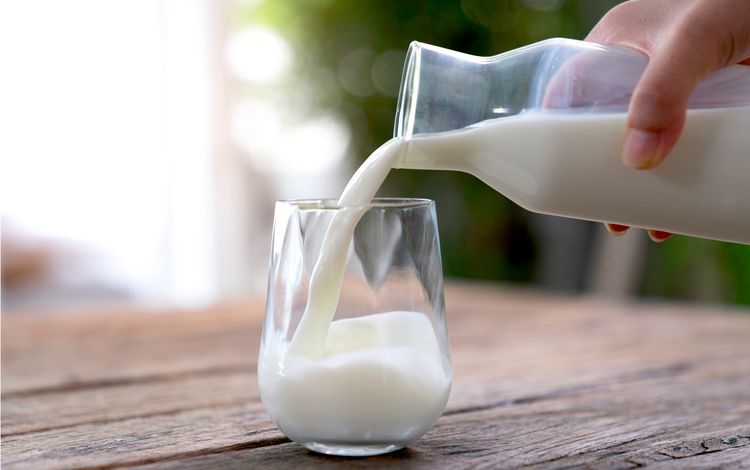Health Benefits of Cow’s Milk
What are the health benefits of cow’s milk?
Cow’s milk is a rich source of essential nutrients that are important for overall health and well-being. Here are some of the key health benefits of consuming cow’s milk:
1. Nutrient-Rich:
- Calcium: Cow’s milk is one of the best dietary sources of calcium, essential for building and maintaining strong bones and teeth.
- Protein: It provides high-quality protein, which is important for muscle growth, repair, and overall body function.
- Vitamins: Cow’s milk is a good source of several vitamins, including vitamin D, vitamin B12, riboflavin (vitamin B2), and phosphorus, which are important for various metabolic processes and overall health.
2. Bone Health:
- Calcium and Vitamin D: The combination of calcium and vitamin D in cow’s milk helps maintain bone density and reduces the risk of osteoporosis and fractures, especially as you age.
- Phosphorus: Phosphorus in milk works synergistically with calcium for bone health.
3. Muscle Growth and Repair:
- Protein: The protein in cow’s milk provides essential amino acids necessary for muscle growth, repair, and maintenance.
4. Heart Health:
- Potassium: Cow’s milk contains potassium, which helps regulate blood pressure and supports heart health.
- Reduced Risk of Cardiovascular Disease: Some studies suggest that moderate consumption of dairy products, including cow’s milk, may be associated with a reduced risk of cardiovascular disease.
5. Weight Management:
- Protein and Satiety: The protein content in cow’s milk can help promote feelings of fullness and satiety, which may aid in weight management and appetite control.
6. Hydration:
- Fluid Content: Cow’s milk is a hydrating beverage that provides fluid to the body, helping prevent dehydration.
7. Dental Health:
- Calcium and Phosphorus: The calcium and phosphorus in cow’s milk contribute to dental health by strengthening tooth enamel and preventing tooth decay.
8. Immune Function:
- Vitamins and Minerals: The vitamins and minerals in cow’s milk, such as vitamin D, vitamin A, and zinc, play important roles in supporting immune function and overall health.
9. Growth and Development:
- Children and Adolescents: Cow’s milk is an important part of a child’s diet, providing essential nutrients for growth and development, including calcium, protein, and vitamins.
Considerations:
- Lactose Intolerance: Some individuals may be lactose intolerant and unable to digest lactose, the sugar found in cow’s milk. In such cases, lactose-free or dairy alternatives may be more suitable.
- Allergies: Cow’s milk allergy is one of the most common food allergies, particularly in children. Individuals with milk allergies should avoid cow’s milk and opt for alternative milk options.
Summary:
Cow’s milk is a nutrient-rich beverage that provides essential nutrients such as calcium, protein, vitamins, and minerals, which are important for bone health, muscle growth, heart health, and overall well-being. However, individual tolerance and preferences should be considered when incorporating cow’s milk into the diet.
What are the health risks of cow’s milk?
While cow’s milk provides many health benefits, it can also pose certain risks for some individuals. Here are some potential health risks associated with cow’s milk consumption:
1. Lactose Intolerance:
- Digestive Discomfort: Many individuals are lactose intolerant, meaning they have difficulty digesting lactose, the sugar found in cow’s milk. Consumption of cow’s milk can lead to symptoms such as bloating, gas, diarrhea, and abdominal discomfort in lactose-intolerant individuals.
2. Cow’s Milk Allergy:
- Immune Response: Cow’s milk allergy is one of the most common food allergies, particularly in children. It occurs when the immune system reacts to the proteins found in cow’s milk, triggering symptoms such as skin rash, hives, gastrointestinal upset, difficulty breathing, and in severe cases, anaphylaxis.
3. Potential for Contaminants:
- Hormones and Antibiotics: Conventionally produced cow’s milk may contain traces of hormones and antibiotics used in dairy farming, which can be a concern for some individuals, particularly those with sensitivities or allergies.
- Pesticides and Environmental Contaminants: Cow’s milk can also contain traces of pesticides and environmental contaminants if the cows are exposed to contaminated feed or environments.
4. High in Saturated Fat:
- Cardiovascular Health: Whole milk and full-fat dairy products are high in saturated fat, which, when consumed in excess, can contribute to elevated cholesterol levels and an increased risk of heart disease, particularly in individuals with existing cardiovascular risk factors.
5. Potential for Childhood Obesity:
- Caloric Density: Whole milk and dairy products can be calorie-dense, which may contribute to excessive calorie intake in children, potentially leading to overweight or obesity in children if not consumed in moderation.
6. Acne and Skin Conditions:
- Hormonal Effects: Some studies suggest that the hormones present in cow’s milk may exacerbate acne and other skin conditions in susceptible individuals. However, more research is needed to fully understand this relationship.
7. Environmental Impact:
- Resource Intensive: Dairy farming has significant environmental impacts, including greenhouse gas emissions, water usage, and land degradation. Some individuals choose to avoid cow’s milk due to concerns about its environmental footprint.
8. Ethical Considerations:
- Animal Welfare: Concerns about animal welfare and the treatment of dairy cows may lead some individuals to avoid consuming cow’s milk for ethical reasons.
Considerations:
- Individual Tolerance: The tolerance to cow’s milk can vary widely among individuals. Some people may tolerate cow’s milk without any issues, while others may experience discomfort or adverse reactions.
- Alternatives: For individuals who are lactose intolerant, allergic to cow’s milk proteins, or choose to avoid cow’s milk for other reasons, there are many dairy-free alternatives available, such as soy milk, almond milk, coconut milk, and oat milk.
Summary:
While cow’s milk provides essential nutrients and can be part of a healthy diet for many people, it may pose risks for individuals who are lactose intolerant, allergic to cow’s milk proteins, or have concerns about hormones, antibiotics, saturated fat, environmental impact, or animal welfare. It’s important for individuals to consider their own health status, dietary preferences, and ethical beliefs when making decisions about cow’s milk consumption.




